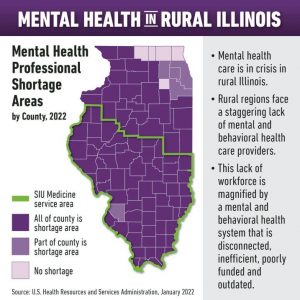Rural residents at a disadvantage with mental health services
By Tammie Sloup FarmWeek — June 2, 2022
Heather Whetsell, Southern Illinois University Medicine Population Science & Policy administrative director, presented findings of a yearlong study into mental health care in rural areas during the National Rural Health Association’s Annual Rural Health Conference. (Screenshot of presentation by Tammie Sloup of FarmWeek)
The sea of dark purple on a map of Illinois counties told a concerning story.
Most of the counties were dark purple, indicating a shortage of mental and behavioral health providers in those areas. Only a handful of counties, mostly in Cook County and the collar counties, had no shortage or partial shortages.
But it’s not just an Illinois issue. Mental health care in rural areas throughout the U.S. is in crisis.
Heather Whetsell, Southern Illinois University Medicine Population Science & Policy administrative director, presented findings of a yearlong study into mental health care in rural areas during the National Rural Health Association’s (NRHA) Annual Rural Health Conference. The research was conducted by the NRHA Rural Health Fellows mental health workgroup.
Barriers to mental health care in rural America are driven by three factors: availability of health care, access and acceptability, the fellows found.
“There are a lot of efforts going into trying to recruit and retain providers in these areas, but as you know, it’s an uphill battle,” said Janessa Graves, associate professor of nursing, Washington State University, who grew up in central Illinois.
When it comes to acceptability, the fellows are specifically referring to stigma.
“It’s a documented problem in rural communities; mental health stigma both for discussing issues but then also accessing services,” Graves said. “Also, health literacy is an issue and then lack of privacy. I live in a town of 2,000 people and everyone knows when I go get my hair cut, much less if I’m frequenting a mental health care provider in my town.”
The report was not all doom and gloom, as part of its policy brief includes recommendations as well as innovative projects already in the works.
A heavy emphasis was placed on workforce recruitment and retention, including stipends and paid internships for rural providers, expansion of loan repayment programs, salary and bonus incentives and equitable grant making so all government funding isn’t going to larger, urban health centers with experienced grant writers.
The health and wellness of the workforce also must be maintained and even enhanced for mental health providers to stay in rural areas.
“You can’t pour from an empty cup,” said Brenda Mack, assistant professor of social work, Bemidji State University. “If we are emotionally exhausting our mental health care providers, they’re not going to have anything else to give to the patients.”
Other recommendations to address barriers included co-locations of services, expanding prevention programs, Medicare expansion for mental health providers and community engagement activities.
Mack hosts a monthly project called Cultivating Resiliency for Women in Agriculture, which is essentially a virtual coffee chat with an emphasis on wellness and well-being.
“We have folks who are joining us from their tractors and from their barns,” she said.
In Illinois, Whetsell outlined the Healthy Hillsboro project, which launched when a frightening trend of youth suicide attempts emerged in the community.
The Partnership between SIU Medicine Department and Hillsboro Area Hospital won the 2022 NRHA Outstanding Rural Health Program Award for developing an assessment of contributing factors to the trend while involving a coalition of community members to best choose programs to meet the needs of local youth.
“One major benefit that we’ve seen already is a decrease in stigma around mental health,” Whetsell said. “And getting the youth to talk about it.”
This story was distributed through a cooperative project between Illinois Farm Bureau and the Illinois Press Association. For more food and farming news, visit FarmWeekNow.com.
Workshop addresses mental health needs of those in agriculture life







